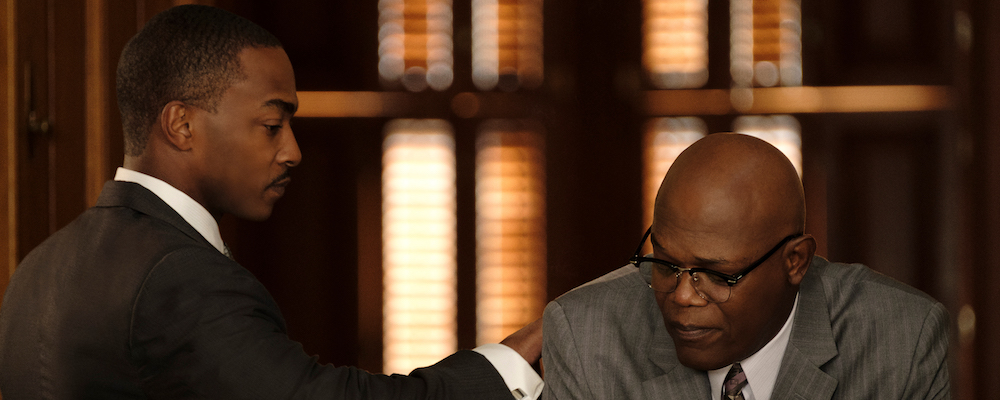‘The Banker’ Sheds Light on Systemic Racism and Housing Discrimination
Sandra Miska
The true story of a pair of African-American entrepreneurs who helped end de facto housing segregation in Los Angeles and pave the way for the Fair Housing Act of 1968 is brought to life in “The Banker.” Anthony Mackie and Samuel L. Jackson star as Bernard Garrett and Joe Morris, two trailblazers who used a white associate, Matt Steiner (Nicholas Hoult), as their frontman to create a real estate and banking empire.
“The Banker” begins in 1965, when Bernard is about to testify in D.C. Flashback to 1939, and he is a young boy in small-town Texas shining shoes to help his family make ends meet. Although he has a passion for mathematics and business, his father (Gregory Allen Williams) discourages him from trying to follow in the footsteps of the white businessmen he spies on in order to learn, telling him that he was “born the wrong color.” 15 years later, he relocates to Los Angeles with his supportive wife, Eunice (Nia Long), and their young son, Bernard Jr.(Jaylon Gordon), in hopes of making it in real estate. He starts off by buying and renovating an apartment building, and what’s great is that it doesn’t matter to him when a racist old white lady moves out, as he can make more money and help his community by renting to professional African-Americans who have been discriminated against by white landlords.
Unfortunately, racial barriers prevent Bernard from buying single-family homes, which leads him to partner with an Irish businessman, Patrick Barker (Colm Meaney). After Patrick dies and his widow refuses to honor their agreement, Bernard turns to Joe, a successful nightclub owner who owns several other properties. Although it might seem like a no-brainer for Bernard to want to team up with a successful black businessman, he initially bulks when Eunice first attempts to connect the two, as the straight-laced Bernard sees Joe as “degenerate,” as he drinks during the day, sleeps around, and cracks crude jokes. However, after numerous other doors are closed on him, he changes his mind. Mackie and Jackson have a fun and interesting dynamic as Bernard and Joe build a partnership together, and the latter brings much comic relief.
Bernard then makes the decision to buy what was the largest commercial building in downtown Los Angeles and lease space to banks, rationalizing that they can’t deny loans to them and other African-Americans with two black men as their landlords. To accomplish this, they need another white frontman, so they recruit Matt, a friend of Bernard’s young cousin who previously helped him out with renovations. While Matt is serious about going into business, he lacks Bernard’s brains and Joe’s charisma, and director George Nolfi and the actors amuse as the older men and Eunice play “My Fair Lady” with Matt.
Both Bernard and Joe assist Matt on the ground by acting as his chauffeur and janitor at different times. While Joe has fun with the charade, Bernard finds it demeaning. Unlike Joe, who comes from a more affluent background, he actively avoided these types of jobs as a young man. Joe also gets creative when it comes time to get the working-class Matt onto the golf course at an exclusive club in order for him to wheel and deal. He recruits a valet he knows there to let him in. Rich white people may have had the keys to the front door at these places, but others guarded the back doors.
After much success in Los Angeles, Bernard talks Joe and Matt into coming with him back to Texas in order to positively impact his former community by buying a bank there and giving loans to African-Americans. However, complications arise after some white people get wind of the situation. Matt, meanwhile, compounds the situation by becoming too big for his britches.
Nolfi and his co-writers don’t attempt to dumb down the financial lingo, and for those who are not enthralled by that world, the film feels stiff at times. However, what it does best is shed light on how systemic racism, particularly in banks and the housing market, held back African-Americans during the 1960s and before. Although the United States has come a long way since then, in no small part due to people like Garrett and Morris, one can still find parallels in “The Banker” to our world today.
“The Banker” opens March 6 in select theaters and begins streaming March 20 on Apple TV+.

